Kidney stones, those mineralized clumps that form within the kidneys, are notorious for causing excruciating pain. While most people imagine stones as large, jagged masses, they can actually come in various sizes, with punctate kidney stones being some of the smallest. Despite their diminutive stature, these tiny stones can still pack a punch, causing discomfort and requiring attention.
Punctate Kidney Stones: What They Are and How They Form
Punctate kidney stones, also known as microliths or gravel, are essentially very small stones, typically measuring less than 2 millimeters (mm) in diameter. For reference, a standard pencil eraser is about 5 mm wide. These stones form due to an imbalance in the chemical composition of urine. Normally, urine contains dissolved minerals and salts, along with waste products the body needs to eliminate. However, when the concentration of certain minerals, like calcium oxalate or uric acid, becomes too high, or urine volume decreases significantly, these minerals can precipitate out of solution and crystallize, forming stones.
Several factors can contribute to punctate kidney stone formation:
- Diet: A diet high in animal protein, sodium, and oxalates (found in spinach, beets, nuts) can increase the risk of calcium oxalate stones, the most common type. Conversely, low fluid intake concentrates urine and makes stone formation more likely.
- Medical conditions: Certain medical conditions like gout, hyperparathyroidism (overactive parathyroid gland), and recurrent urinary tract infections (UTIs) can predispose someone to specific types of stones.
- Medications: Some medications, such as diuretics and certain weight-loss drugs, can alter urine chemistry and increase stone risk.
- Family history: Having a family history of kidney stones significantly increases your chances of developing them.
Signs and Symptoms
Unlike their larger counterparts, punctate kidney stones often don’t cause the excruciating pain typically associated with kidney stones. This is because their small size allows them to move more freely within the urinary tract, sometimes passing unnoticed. However, some individuals may experience:
- Microscopic hematuria: This refers to the presence of blood in the urine, often undetectable without a urine test.
- Flank pain: A dull ache or discomfort may be felt on one or both sides of the lower back, where the kidneys are located.
- Urinary urgency or frequency: The need to urinate more often than usual, even at night, can occur.
- Burning sensation during urination: Discomfort or a burning feeling while passing urine may be present.
It’s important to note that these symptoms can also be indicative of other urinary tract issues like UTIs. If you experience any of these signs, consulting a doctor for a proper diagnosis is crucial.
Diagnosis: Unveiling the Tiny Culprit
Diagnosing punctate kidney stones typically involves a combination of tests:
- Urinalysis: This basic test checks for the presence of blood, white blood cells, and other abnormalities in the urine.
- Microscopy: A urine sample may be examined under a microscope to identify any crystals or small stones.
- Imaging studies: Imaging tests like X-rays, ultrasounds, or CT scans may be used to visualize the urinary tract and identify stones, though punctate stones can sometimes be too small to show up on X-rays.
Early diagnosis of punctate kidney stones is essential to prevent them from causing complications. If left untreated, these tiny stones can:
- Grow larger: Over time, punctate stones can accumulate minerals and grow bigger, potentially causing blockage and severe pain.
- Lead to infection: Stones can obstruct urine flow, creating a stagnant environment that promotes bacterial growth and UTIs.
- Damage the kidneys: Chronic obstruction due to stones can damage the filtering function of the kidneys.
Treatment Options
The good news is that punctate kidney stones often pass on their own without any intervention. However, depending on the severity of symptoms and the presence of additional factors, treatment options may include:
- Increased fluid intake: Drinking plenty of water helps dilute urine and flush out the stones. Aim for 2-3 liters of fluids daily.
- Pain medication: Over-the-counter pain relievers like ibuprofen or acetaminophen can help manage discomfort.
- Alpha-blockers: These medications relax the muscles in the ureter, allowing for easier stone passage.
- Lithotripsy: This non-invasive procedure uses shockwaves to break down larger stones into smaller fragments that can then pass more easily. While typically used for larger stones, advancements in technology may make it suitable for some punctate stones.
Prevention is Key
Once you’ve experienced punctate kidney stones, preventing their recurrence becomes crucial. Here are some strategies to minimize the risk:
- Dietary modifications: A balanced diet low in animal protein, sodium, and oxalates, while rich in fruits and vegetables, can help maintain a healthy urinary pH and reduce stone formation.
- Increased fluid intake: As mentioned earlier, staying well-hydrated is vital. Aim for 2-3 liters of water daily to dilute urine and prevent mineral concentration.
- Dietary supplements: Citrate supplements like potassium citrate can help make urine less acidic and decrease the risk of calcium oxalate stones. However, before to using any supplements, speak with your physician.
- Maintaining a healthy weight: Kidney stones are a risk factor for obesity. It might be advantageous to maintain a healthy weight with food and exercise.
- Addressing underlying conditions: If you have a medical condition that contributes to stone formation, managing it with proper medication and treatment is crucial.
- Regular follow-up with your doctor: Regular check-ups with your doctor allows for monitoring of urine composition and early detection of any potential stone formation.
Living with Punctate Kidney Stones
Punctate kidney stones, while potentially uncomfortable, are generally a manageable condition. Early diagnosis, appropriate treatment, and preventive measures can help minimize their impact on your life. By understanding the causes, symptoms, and treatment options, you can take control of your health and prevent future occurrences. Remember, even though these stones are small, it’s important to address them to avoid potential complications. If you experience any signs or symptoms suggestive of kidney stones, don’t hesitate to consult your doctor for a proper diagnosis and treatment plan.
